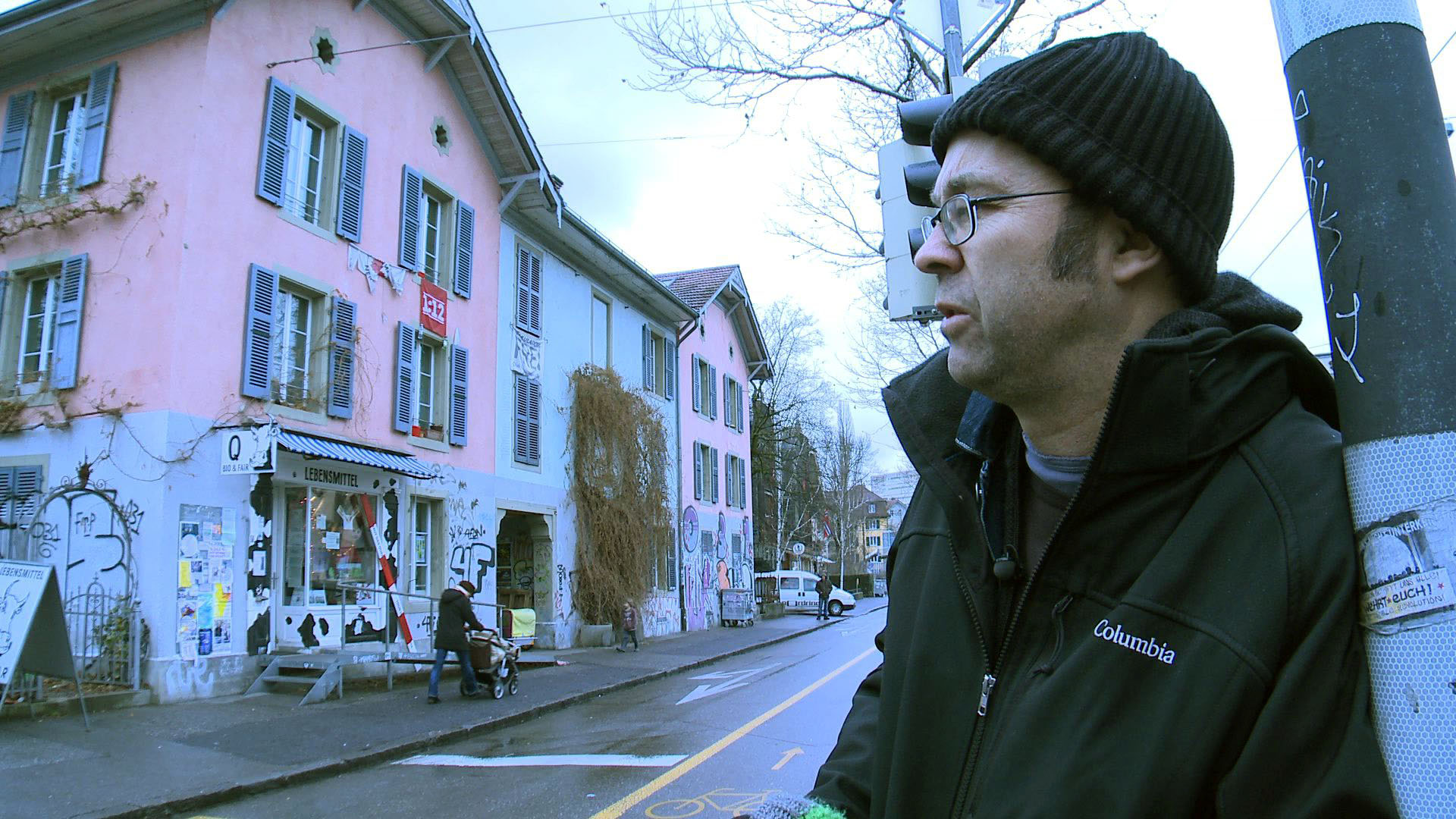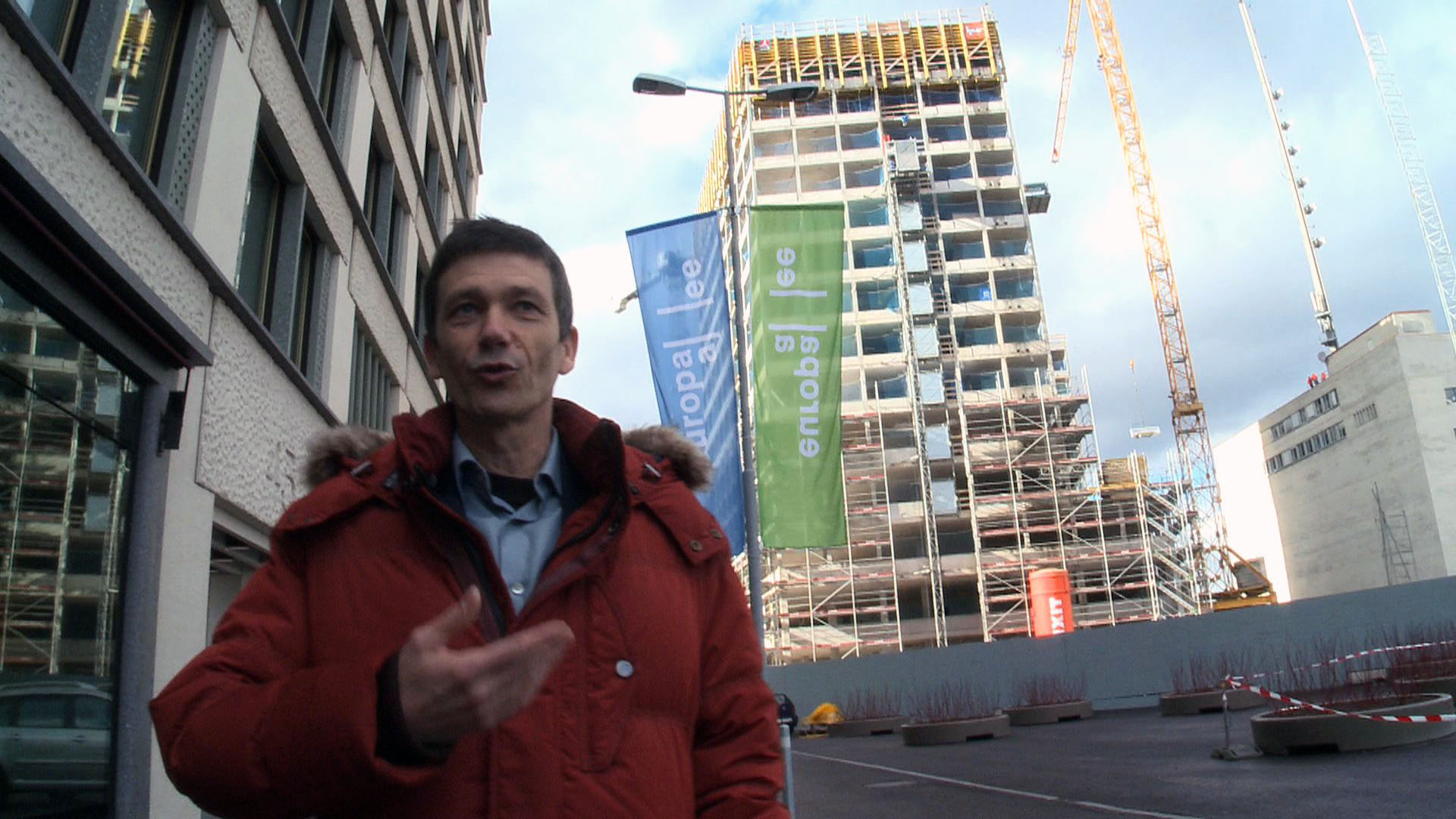
Communities fight the property bubble effect

In the shadow of a potential property bubble, concerned residents are coming up with ways to stop the places they know and love from changing dramatically. What kind of impact is co-operative housing having on the market in Zurich and Bern?
Johannes Wartenweiler, a long-term resident of the Lorraine area of Bern is worried about the future of his neighbourhood, where individual buy-to-sell investors can “demand up to CHF2 million ($2.2 million) for seven rooms”, and the effect this influx of money will have on rents.
He formed a co-operative in this much talked about area in 2008, with his family making up one part of the set-up in a four-apartment building with two other families and a couple.
“The Lorraine area is characterised by having a good network where people have a lot to do with each other; joint projects, political action…it would be a real shame if a change in the population here led to a loss of these qualities,” he concluded.
swissinfo.ch went inside two different co-operatives in Bern, to see how local residents are fighting to up their sense of community, while keeping their costs down.

More
Alternative approach makes housing affordable
In Zurich, a housing association on a much larger scale is tackling the same issue as the Rossfeld co-operative.
“I know people who live in buildings in this part of the city, who don’t know what will happen to them, because this area has increased in value so much. They’re afraid they’ll be told to get out,” said Ursula Enderli, a resident of an apartment owned by the affordable housing foundation, PWG in Wiedikon, Zurich.
Enderli’s sunny, three-room apartment was bought by the PWG in 2008 and her rent – CHF 1,128 per month (about CHF400 less than the Zurich average) – has barely changed since then.
She’s in the minority though – across the country, non-profit housing accounts for only about 4% of the overall market, according to the Federal Statistics Office.
Zurich’s PWG foundation is one of the biggest associations in the country to offer this kind of housing; it owns both residential and commercial properties with rental prices firmly below market rates.
Rent is the major source of income, with the exception of a maximum of CHF5 million per year since 2010 from the city of Zurich for purchasing particular properties.
“If everyone operated like the PWG foundation, rents and real estate prices would be considerably lower, as we invest in a much more sustainable way,” Jürg Steiner, director of the PWG told swissinfo.ch
“Despite our 1,700 properties, we have no influence on the market, although it of course, has a great influence on us,” he added.
Rising rents
Figures from the Federal Statistics Office show the overall average rent in canton Zurich was CHF1,485 in 2010, rising to CHF1,515 in 2011.
The latest figures from real estate website Homegate.ch, showed that rents across the country increased by 1.84% in December 2013 compared to a year earlier.
In the city of Zurich, to rent a 100 metre-square apartment cost on average CHF2,633 in 2013, 40% more than it would have in the nearby town of Winterthur.
Demand for popular locations continues to stay high. The Bern Cantonal Bank in January said they saw “overheating tendencies” in the real estate market in and around Bern, while a study by the Federal Institute of Technology in Zurich (ETHZ) and price comparison website, comparis.ch, said although prices in Zurich are still rising, the rate of growth is slowing.
Changing neighbourhoods
The Swiss housing market has been persistently straying in and out of the zone where it could be defined as showing signs of bubble-like conditions. One effect of this high-demand, short supply market has been a rapid flow of change in up and coming areas, in terms of building renovation, tenant demographics and prices.
This effect is not a concern for everyone though. Developers of high-end apartment complexes believe they too deserve a spot in areas in demand and claim the steeper costs are justified.
“The property bubble was not an issue for us on this project,” said Andreas Steiger, who is responsible for the development and building of the Europaallee site, a large, multi-building development taking shape right next to Zurich’s main railway station.
Europaallee is just down the road from the Langstrasse area, famous for its amorous night spots and busy bars. The site combines office and retail space with new apartments for sale and up for rent; a top floor residence with 3.5 rooms can be rented for CHF5,500 per month.
“We’re in a central location that should strongly retain its value. The property bubble means that the price paid for a property now could not be achieved later on. This will not be the case in the apartments for sale, as I’m convinced that in this location, the sale price will stay just as high,” said Steiger.

More
Expensive, but worth the price
Political action
In this climate, housing associations say it’s time the authorities stepped in to increase the share of affordable homes in increasingly high-cost hotspots.
In 2011, the Zurich Association of Housing Co-operatives (wbg Zurich) secured an agreement after a popular vote to increase the amount of non-profit housing in the city to 1/3 of all rented property.
They say urban sprawl means canton Zurich needs to put similar measures in place, citing a slow downward trend in the current stock.
“In places where demand for living space is already extremely high, we also see a reduction in the number of housing co-operatives, because land for building on is overpriced and the properties can then only become owner-occupied buildings,” Urs Hauser, director of the Swiss Association of Housing Co-operatives (wbg Schweiz) told swissinfo.ch
Reflecting on the idea of overpricing leading to a property bubble forming, Hauser added, “whether there is or isn’t a bubble, what is important is that there is a certain share of not-for-profit housing, not least because these properties are on average 15% cheaper than the market value, and they dampen down the market”.
Johannes Wartenweiler from the co-operative in Lorraine, Bern urges caution not just from a financial standpoint, “care has to be taken that the people moving in are not simply the type who want to live here and don’t want anything to do with the neighbourhood”.

In compliance with the JTI standards
More: SWI swissinfo.ch certified by the Journalism Trust Initiative






























You can find an overview of ongoing debates with our journalists here . Please join us!
If you want to start a conversation about a topic raised in this article or want to report factual errors, email us at english@swissinfo.ch.